Singapore forms electoral boundaries committee, here’s who they comprise & what they’ll do

Prime Minister Lawrence Wong has formed a committee to review electoral boundaries, initiating the process for Singapore’s upcoming general election.
Typically, the time between the formation of the Electoral Boundaries Review Committee (EBRC) and Polling Day has ranged from four to 11 months, which means that voters could go to the polls in May, or even earlier if the committee is able to complete its work in time.
The EBRC will comprise five senior civil servants:
- Colin Low, chief executive of Singapore Land Authority
- Tan Meng Dui, chief executive of the Housing Development Board
- Koh Eng Chuan, chief statistician of the Singapore Department of Statistics
- Lim Zhi Yang, head of ELD, and
- Tan Kee Yong, Secretary to the Prime Minister, as its chairman.
The committee has been directed to review the boundaries of the current electoral divisions, and to recommend the number of boundaries of Group Representation Constituencies (GRCs) and Single Member Constituencies (SMCs).
The Committee will take into account significant changes in the number of electors in the current divisions as a result of population shifts and housing developments. It will then produce a report that goes to the Parliament, which will decide whether to accept the new boundaries.
This is a necessary step before a general election can happen. There is no fixed timeline given to the committee to issue its report, but past teams have taken between three weeks and seven months.
“I look forward to the committee’s report and its recommendations in due course,” said PM Wong in a Facebook post, addressing the convened EBRC.
Check out our GE2025 microsite for the latest election-related news, find out which constituency you belong to, and more here.
Also Read: Poetry, cats and Jay Chou: 7 interesting facts you probably didn’t know about Tharman
Featured Image Credit: Elections Department Singapore
Less screen time, more quality time: Here’s how S’pore plans to fix the iPad kid epidemic

I have fond memories of my carefree childhood days with neighbourhood friends, whether at the playground or elsewhere, but such sights seem rare today.
Now, it’s more common to see children glued to their phones and tablets, endlessly scrolling social media or watching their favourite shows—and this shift isn’t necessarily a positive one.
To tackle this issue, the Ministry of Health (MOH) launched updated guidelines on Tuesday (January 21) as part of the new Grow Well SG national health strategy, aiming to curb excessive screen time and promote healthier lifestyles for children and adolescents up to 12 years old.
The revised guidelines provide stricter and clearer recommendations on screen use. Here’s what you should take note of:
Who gets screen time?
For children under 18 months:
- No screen time, except for video calls
- Televisions or other screens should not be turned on in the background
For children aged three to six:
- Limit screen use to no more than one hour per day outside of school
- View media together with children whenever possible
- Choose age-appropriate educational content
- Do not leave screens turned on in the background
- No screens during meals and one hour before bedtime
For children aged seven to 12:
- Limit screen use to under two hours daily, except for school work
- Develop a screen use plan or timetable
- Have regular conversations to find out their online activities
- No mobile devices with unrestricted access
- Use parental control settings for age-appropriate content and apps
- No screen time during meals and one hour before bedtime
In a joint statement, MOH, the Ministry of Education (MOE), and the Ministry of Social and Family Development emphasised that children in Singapore are facing health risks linked to inactive lifestyles.
These risks arise from several factors, including excessive screen time. Through the Grow Well SG initiative, the government aims to help children cultivate healthy habits by promoting more purposeful screen use with the combined efforts of families, schools, healthcare institutions and the community.
Though the new strategy only focuses on children aged up to 12 years old, it will be extended to older children subsequently.
Similar moves by other countries
Singapore isn’t the only country that has implemented such guidelines. As more studies emerge on the negative effects of excessive screen time, several other countries have also taken steps to regulate screen use among youth.
In September 2024, France enforced a trial ban on phones for students up to the age of 15 as it seeks to give them a “digital pause.” Students are now required to hand over their phones to school staff at the start of the day.
Brazil went a step further, passing a law restricting smartphone usage in elementary and high schools this month.
Beyond the detrimental effects excessive screen time can have on the youth, exposure to social media platforms can also bring about adverse impacts on their well-being.
With growing pressure to protect children online, particularly from harmful content and cyberbullying, countries like Indonesia are planning to introduce a minimum age for social media users. This follows Australia’s 2024 law, which bans under-16s from using social media.
Social media age restrictions

Apart from the government, tech companies and social media firms have also doubled down on their efforts to protect the youth from digital harm.
In 2021, TikTok removed over seven million suspected underage accounts. It also restricted features like private messaging and live streaming to those aged 16 and above.
More recently, Instagram has also taken steps to tighten age restrictions for app users. As of yesterday, accounts belonging to those under 18 in Singapore will have more restrictive settings by default.
Teenagers will automatically be placed in Teen Accounts, and those attempting to change their age to over 18 will be prompted to verify their age.
It takes a community
Raising screen-free kids requires more than just the efforts of tech companies and the government—it takes a community.
In Singapore, grassroots initiatives like The Resonance Project, founded by a group of teenagers, offer free music classes to various communities including children, creating opportunities for them to engage in meaningful, screen-free activities.
Balance Bike SG, on the other hand, organises public events such as family-friendly cycling competitions.
Through these efforts, we can foster healthier lifestyles and create an environment where children can thrive without the constant pull of digital screens.
- Read more articles we’ve written about Singaporean startups here.
Also Read: Why this S’porean scrapped the old menu at his mum’s 19 Y/O cafe to serve just two items
Feature Image Credit: iStock
CARiNG’s CNY video reminds us what “home” really means, and it’s not about a place

[This is a sponsored post with CARiNG Pharmacy.]
As a working adult juggling deadlines, bills, and the constant hustle for financial stability, I’ve come to realise how tough it is to gather for dinners with loved ones. It’s not just my problem; I know many others who feel the same way.
The pressures of work and the relentless pursuit of success often leave little room for family time.
As Chinese New Year approaches, the warmth of reunion dinners takes centre stage in households across the globe. Yet, not everyone gets to experience this cherished tradition in the same way.
CARiNG Pharmacy’s latest CNY video captures this poignant reality, shedding light on the struggles some families face while reminding us of the true meaning of togetherness.
Experience the video in full below:
Since starting their annual CNY video tradition in 2022, CARiNG has consistently aimed to celebrate the togetherness of family. This year’s instalment is no exception, delivering a heartfelt story that would resonate with anyone who has ever struggled to balance work and family.
The hustle never stops
The three-minute video opens with a scene that feels all too familiar: a family working hard to make ends meet. The father, a shopkeeper, anxiously watches the hours tick by on New Year’s Eve, worried about the unsold mandarin oranges piling up in his store.
“If these oranges don’t sell today, they’ll lose their freshness,” he said, clearly torn between his responsibilities as a provider and his desire to be home for the reunion dinner.
How many of us have worked late nights, skipped meals, or postponed family time because we were chasing financial stability?

The father’s situation is a reflection of the sacrifices so many families make just to stay afloat, especially with today’s rising living costs.
A family’s love in action
Back at home, the rest of his family is busy preparing for the reunion dinner. The mother and children’s banter while cooking lightens the mood, contrasting the father’s solitary efforts at the shop.
“Less oil, less salt, less sugar,” the daughter reminded her brother, ensuring the meal aligns with their father’s dietary needs. It’s a simple yet powerful moment, showcasing how love is often expressed through small yet thoughtful actions.
The cooking scene feels warm and intimate, evoking memories of family kitchens filled with laughter and the comforting aroma of home-cooked meals. But there’s still an underlying sadness to the scene as the family prepares without the father.

The turning point comes when, instead of waiting at home, the family decides to bring the reunion dinner to the shop. Their arrival takes the father by surprise.
“Home is where the whole family is together,” the mother said, her words carrying a message that resonated deeply.
As the family shares their meal amidst the stacks of unsold mandarin oranges, the atmosphere shifts from sombre to joyful.
Watching this scene made me think about how often we get caught up in the “where” and “what” of celebrations, forgetting that it’s the “who” that truly matters. At the end of the day, it’s not about the setting or the spread, rather it’s the people who make the moment special.
A timeless message
CARiNG Pharmacy’s video ends with a poignant message: “Home is wherever you are.” It’s a statement that lingers as the background fades, encouraging viewers to reflect on the essence of family and togetherness.
In a world where the pressures of daily life often overshadow the importance of connection, this video serves as a gentle nudge to cherish the moments that truly matter.
Hand in hand with the launch of this heartfelt video is CARiNG’s 88 Huat Huat Megasales, running now until February 11, 2025.

The sale offers discounts on haircare, body care, beauty products, and daily essentials ranging from 18% to 88% off for the second purchase of the same product. It’s a timely opportunity for families to stock up on essentials while enjoying significant savings.
So, this Chinese New Year, let’s take a moment to appreciate the love and effort that goes into keeping our families together. Whether you’re having your reunion dinner at home, at a shop, or even over a video call, remember: wherever your family is, that’s where home will always be.
- Learn more about CARiNG Pharmacy’s CNY deals here.
Featured Image Credit: CARiNG Pharmacy YouTube
M’sian startup iMotorbike completes Series A funding with US$10 million for regional expansion

Malaysian startup iMotorbike announced on January 21, 2025, that it has successfully closed its US$10 million Series A funding round.
Co-founded by Gil Carmo and Sharmeen Looi, iMotorbike is a Southeast Asian platform for buying and selling pre-owned motorcycles.
The round was led by Headline, a global venture capital (VC) firm known for backing transformative B2B and B2C ventures. There was also participation from other prominent VC firms such as Ondine, 500 Global, Gobi Partners, Astor Management, and Endeavor Catalyst.
“We first invested in iMotorbike in 2017, and remain confident that the used motorcycle market globally will remain resilient as riders seek affordable and reliable solutions amid economic uncertainties,” shared Khailee Ng, Managing Partner, 500 Global.
He continued, “As early movers, we believe Gil and his team have built over the last eight years a blueprint for trust and convenience in the motorcycle marketplace, putting them in a strong position to lead this mobility trend far beyond Southeast Asia.”
The Series A round was completed in two tranches with the first being in June 2023 when they had bagged RM12 million, while the latter is the recent funding led by Headline.
Expanding regionally and rapidly
According to a press release, this funding is instrumental in expanding iMotorbike’s footprint locally, where the company plans to open new inspection centres and showrooms in key locations such as Penang and Johor.
The establishment of these showrooms will be integral in bolstering the startup’s presence. After all, iMotorbike’s growth has been partially fueled by the launch of its three-storey Glenmarie showroom in 2024.
Parts of the new funding will also be earmarked for the company’s goal to grow its workforce by hiring skilled mechanics and operations staff.

The expansion plans will also extend outside of Malaysia, with a new branch in Taiwan already being planned.
If you’ve ever been to Taiwan, you may have noticed their streets being full of scooters, perhaps indicating a sizable market for iMotorbike to tap into.
Gil Carmo, the co-founder and CEO of iMotorbike, said, “With this funding, we are excited to take iMotorbike to the next level. Beyond expanding our footprint in Malaysia and opening in Taiwan, we will continue improving our platform and scaling our operations to meet the growing demand.”
Accelerating ahead
Since its founding in 2016, iMotorbike has built a strong presence in Malaysia and Vietnam by focusing on customer trust and convenience.
In fact, the startup reached a significant milestone of 10,000 customers this year. With that achievement, iMotorbike has arguably become the defacto go-to platform for motorcycle enthusiasts locally.
The startup has been able to make its mark in the industry thanks to key offerings such as its thorough 170-point inspection process, plus a hassle-free six-day return and six-month warranty policy.
Gil shared, “From day one, our goal has always been to create a platform that people can trust, whether buying or selling motorcycles. This funding validates the work we have done and the potential of pre-owned motorcycles in Southeast Asia.”
Also Read: Critical convos with a focus on impact: How MRANTI is bridging local & global markets
Featured Image Credit: iMotorbike
Why this S’porean scrapped the old menu at his mum’s 19 Y/O cafe to serve just two items
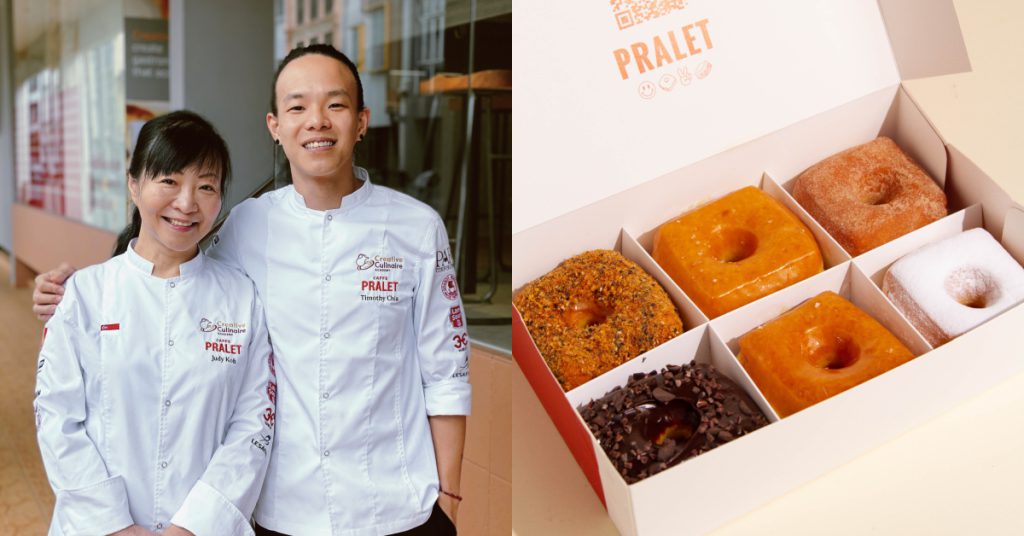
If your daily routine involves scrolling through TikTok for countless hours like me, then you must have come across Caffe Pralet’s square shaped doughnuts on your feed at some point.
Their doughnuts were first launched back in 2023, but it wasn’t until last year that they skyrocketed to fame, thanks to a TikTok reel by one of their customers.
The hype grew so intense that customers even faced two-day waiting times for online orders, with queues snaking outside the cafe at its peak.
Apart from their viral doughnuts, the space also draws a crowd for their loaded sandwiches—however, Caffe Pralet was originally known for their cakes, pastries, and dishes.
The cafe, which has been around for 19 years, saw its business pick up after a revamp and has since turned into a popular hipster hangout in Singapore.
“We never actually had a USP”

When Vulcan Post first spoke to Caffe Pralet, the business was helmed by Timothy Chia, 32, and his brother-in-law Jeremy Ang, 36.
The cafe was opened in 2006 by Timothy’s mother Judy Koh, but the pair took over her business in hopes of continuing her legacy.
However, as the cafe offered a wide range of products, it struggled to establish a unique selling point (USP) and stand out in Singapore’s competitive F&B scene.
[Caffe Pralet] has always done a tonne of different things throughout our years, from selling customised cakes for weddings, to catering, baked goods, and even curry chicken and rice bowls—the list goes on.
You name it, Caffe Pralet has done it. We never actually had a USP because we were doing everything.
Timothy Chia
A pivot to simplicity
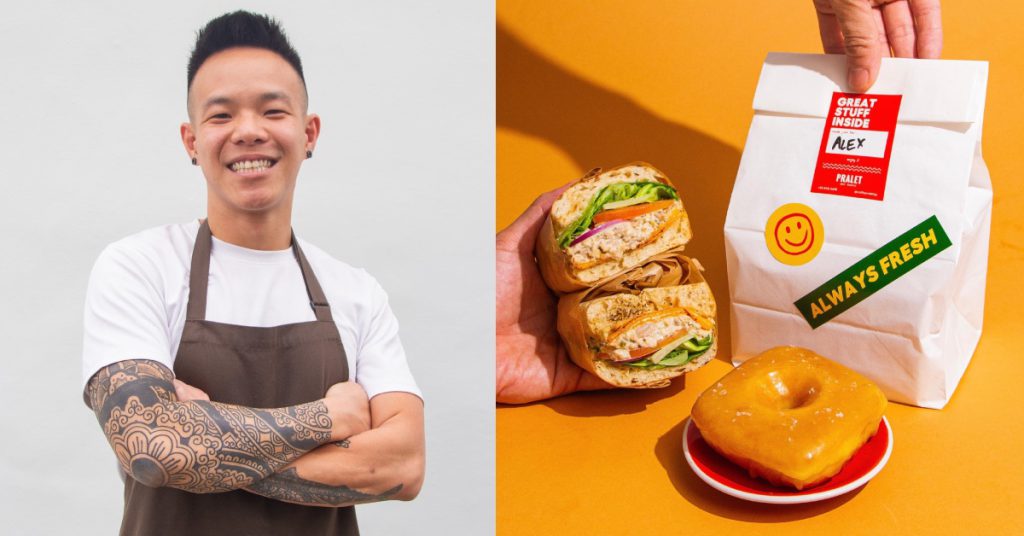
Shortly after the interview in 2018, Timothy took a break from the family business and went to Mexico, where he spent a year and a half hosting private dining events, pop-ups, and culinary classes.
However, he returned to Singapore due to the COVID-19 pandemic. It was during this time that he decided to rejoin the family business and help out with Caffe Pralet’s deliveries.
Seeing his mother struggle to keep the business afloat and make it through the pandemic, Timothy decided to step up and propose a new business idea, determined to redefine Caffe Pralet’s direction.
“I couldn’t just leave her and the business that she [built] with her sweat and tears. I had to try all over once again, but this time, with a different, fresh mindset,” Timothy said.

Drawing from his experiences in Mexico, Timothy crafted a business idea centred on simplicity—to create a streamlined menu with limited yet thoughtfully curated options.
Back in Mexico, I ate at a lot of taquerias, and they were always packed with people. Besides the fact that the Mexicans, of course, love their tacos, it became clear to me that the reason why there were always a lot of people was because of the limit in choices.
If it was a pork taqueria, they would serve everything pork. If it was a chicken place, they would serve everything chicken, and if it was a beef place… you can guess what they were selling.
Timothy Chia
Another strategy he implemented was to ensure that the business was scalable and had strong SOPs in place.
By studying successful quick-service restaurants in Singapore such as Subway, Guzman Y Gomez, and McDonald’s, he recognised that these factors were crucial to their ability to grow and expand across the city-state.
Hence, Timothy decided that Caffe Pralet would pivot into a deli specialising in just two items: doughnuts and sandwiches.
Regulars wanted the old menu back
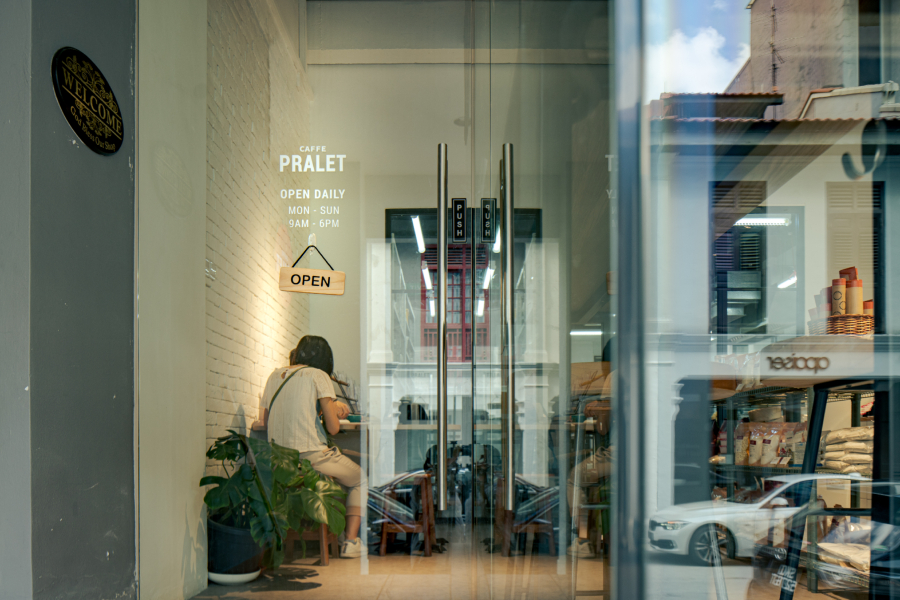
But pivoting a business is never easy. Looking back, Timothy shared that the reception “wasn’t really great” when they first relaunched.
“Our regular customers came back looking for the old menu, for our rice bowls and pasta, but we had promotions going on trying to encourage them to try the new menu.”
While some enjoyed the new sandwiches, most of their regulars, particularly office workers, still craved “heavier” meals.
However, the cafe soon started attracting a different crowd of customers—expats. “Tiong Bahru has become an expat-rich place and a bulk of them are ‘sandwich people’,” said Timothy.
Though we lost part of the rice- and pasta-loving people, we gained a new market of customers, which was great because these were the neighbours living around us. [This] also equated to them coming by more often.
Timothy Chia
Increasing production tenfold

After going viral, Caffe Pralet gained widespread recognition, driving significant growth for the business.
“We couldn’t even sell 40 doughnuts a day, and suddenly, we had to [increase] our production [tenfold],” Timothy shared.
To manage the quick sell-outs, Caffe Pralet encouraged customers to pre-order their doughnuts, ensuring they wouldn’t leave disappointed.
“Besides that, we announced that we had two different fry-times so customers knew when the next batch would be out,” he added.
As demand continued to grow, Caffe Pralet brought in additional staff and expanded the cafe’s production capacity to keep up.
Timothy also shared that the cafe is set to receive their first automatic doughnut fryer soon, a move aimed at further boosting productivity and meeting customer demand more efficiently.
“I don’t want Caffe Pralet to be just a viral trend”
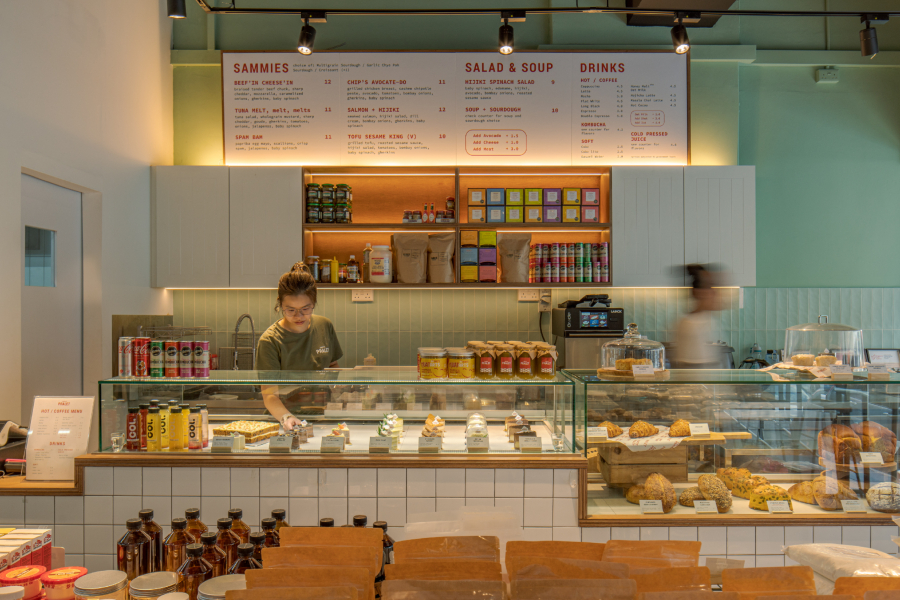
Today, Timothy manages the deli alongside his mother, while Jeremy, who left for family reasons, continues to offer business advice to him.
Timothy revealed that Caffe Pralet is currently “experiencing consistent revenue growth,” but his vision extends beyond short-term success.
I don’t want Caffe Pralet to be just a viral trend. I want the brand to be everlasting—a brand people are familiar with, and a brand that has always maintained its quality and standards.
Timothy Chia
As part of this vision, the cafe is actively working to expand its production capacity and team to support its continued growth.
Back in 2018, the cafe unveiled plans to launch a wholesale and supply arm, however, this initiative still remains a work in progress.
Caffe Pralet also aims to expand internationally. While they previously operated an outlet in Jakarta, the business was heavily impacted by the COVID-19 pandemic, resulting in its closure.
Now, their sights are set on Thailand and China, although Timothy remains tight-lipped about the specifics of these plans.
- Learn more about Caffe Pralet here.
- Read more articles we’ve written about Singaporeans startups here.
Also Read: How these Singaporeans built a multi-million-dollar biz by manufacturing cleaning robots
Feature Image Credit: Caffe Pralet
Sam Altman names key skill that you need in the age of AI. Most people will struggle with it.

Disclaimer: Unless otherwise stated, opinions expressed below belong solely to the author.
Speaking on Adam Grant’s podcast earlier in January, OpenAI CEO Sam Altman made another prediction about the future of work in the age of artificial intelligence (AI), remarking that his children will never outsmart AI (but that will be the reality for everybody).
Coming generations won’t know the world without AI, and all of us will have to adapt to it in one way or another:
My kid is never gonna grow up being smarter than AI. […] And that’ll be natural. And of course it’s smarter than us. Of course, it can do things we can’t, but also who really cares? I think it’s only weird for us in this one transition time.
Sam Altman
So, how will we adapt? What skill will help us stay relevant in the age of AI?
When suggested by Grant that agility rather than ability will play a bigger role, Altman observed that ability will still be valued—not our intellectual processing power, which will never match AI, but rather, our ability to set the right direction for the AI tools at our disposal:
Figuring out what questions to ask will be more important than figuring out the answer.
Sam Altman
While it sounds simple, it may cause problems for most people, especially those whose current jobs are the first to be disrupted by AI tools.
Google on steroids
Here’s why Altman’s remark about the ability to ask questions is so accurate—we already have a tool that grants us access to most human knowledge: Google’s web search.
Yes, after 27 years, it feels outdated, not always accurate, overloaded with ads, etc. But if used properly, you will be able to find information on just about everything you need.
You just have to know what questions to ask.

So, you see, we’ve already taken half a step in that direction, and over the past two decades, it has been up to us to decide how we use it. We could waste our time looking up details on the lives of celebrities or invest it in productive education.
Open access to knowledge has already shaped millions of lives around the world.
AI is just the next stage. It’s Google on steroids—it’s not only able to answer your questions, but soon, also execute most tasks we assign.
It’s going to be faster, more accurate (eventually, at least) and capable of doing many jobs for us. But it will still need our instruction on what to do.
And this will be a challenge for much of the current white-collar workforce.
So, you wanted to be the manager?
Most people enter the labour market hoping to climb the corporate ladder and, in most cases, ascend to higher-paying, managerial roles in a successful company.
Few of them end up in these positions of power, though, since there are always many more foot soldiers than officers in any army.

With AI, however, most positions will become at least infused with the management of the workforce—only this time, it will be digital. AI agents or chatbots will have to be put to use by people who will now have to learn how to direct them.
That is, by giving AI the right problems to solve, the questions that need answering.
Simply telling the intelligent robot to do your current job in your stead will not cut it, because in such a case, your employment will no longer be necessary.
Your job will no longer be performing the task, but directing AI to do it—and it will do a lot more than you did previously. If you wanted to be the manager, then that’s what it’s always been about.
The reason that this is likely to be a challenge for most people (at least in office settings, not manual labour, of course) is that, as I said, most of the labour force is currently employed to do specific tasks that add up to the completion of greater goals set by their management.
With AI, however, your individual on-the-job skillset may soon matter a lot less (if not much at all). What will matter is whether you are able to envision a bigger milestone that you can direct your AI helpers to pursue.
Can you come up with a new product idea? Could you lead an effort to capture a new customer group for a service you sell? Are you able to outline a story for a new book, movie, or video game? Can you direct AI to develop a new engineering solution for a demanding construction project?
Remember that even supremely capable AI will only produce answers that are as good as the questions asked and input information provided. It can’t guarantee that your project will succeed.
This is especially true if everybody else is equipped with the same tools. There are, after all, many good answers to the same question. There are many product designs that will sell, many recipes for tasty foods, many engaging stories to tell, many architectural designs that fulfil the same function and so on.
If everybody is using equally capable AI, then it’s the humans who direct it who will make the difference.
Those who can’t may be forced to return to manual labour.
Also Read: Billionaire CEO stops hiring as AI “can already do all of the jobs”, but promises higher pay
Featured Image Credit: TechCrunch
Why this 30 Y/O F&B group started yet another premium gelato brand in Malaysia

[This article is written in collaboration with GIOIA.]
Malaysia is practically bursting at the seams with gelato brands these days. Everywhere you look, there’s a new gelateria that combines aesthetically pleasing interiors with promises of “artisanal” or “premium” offerings.
A relatively new brand on the scene is GIOIA, which opened its doors in July 2023 and has been steadily expanding.
Last year, our team had the chance to visit the brand’s latest gelato parlour in Chinatown, KL. We went in with some scepticism, wondering how it would stand out from being just another gelato spot.
After all, how much room is left in the already saturated dessert market?
But we were pleasantly surprised as we were greeted by a space that felt like part chic cafe and part cosy hangout spot.

It didn’t seem to be your typical grab-and-go gelato setup, nor was it the kind of place where you awkwardly balance a cone on a tiny stool. GIOIA had something else going on, and once I found out the brand’s story, it was clear why.
The visionary brains behind the joy
GIOIA (which means “joy” in Italian) isn’t just some random brand trying its luck. It’s the lovechild of three founders who actually know their stuff, supported by a passionate team and partners.
Leading the charge is Master Chef Eric Wong, with 43 years of F&B experience under his belt. The man’s practically a master baker and gelato Gandalf, having trained chefs around the globe, including in Italy itself.

Then there’s Pivian Liew, a seasoned entrepreneur who played a pivotal role in creating and nurturing the brand, now leading the group’s business development efforts.
And finally, there’s Carmen Liew, a law graduate who traded legal jargon for gelato dreams, ensuring the day-to-day operations run seamlessly.
GIOIA operates under the umbrella of Levain Group, an F&B powerhouse with 30 years of experience, founded by Eric and Pivian themselves. So, yes, it looks like they’ve got both the expertise and the resources to make this venture a success.
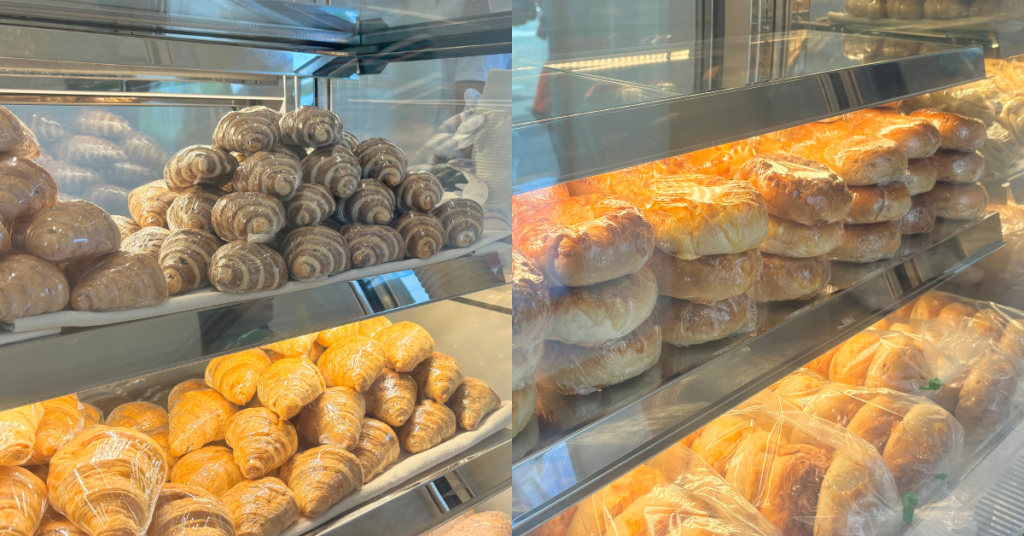
Levain Group is an F&B consultancy and equipment supplier based in Malaysia. They specialise in providing turnkey solutions for F&B businesses, offering services such as menu R&D, advanced machinery supply, and premium frozen breads and pastries.
So, why another gelato brand?
Despite Malaysia’s gelato market being saturated, GIOIA saw an opportunity to redefine what premium gelato could be.

Unlike many competitors, GIOIA freshly churns its gelato right in front of customers, using 100% natural ingredients without any compromises, the founders shared with Vulcan Post.
“We position ourselves as premium from the initial stage because we believe consumers deserve a good choice to pamper themselves,” they explained. “It’s not about the price; it’s about the quality and the entire GIOIA experience.”
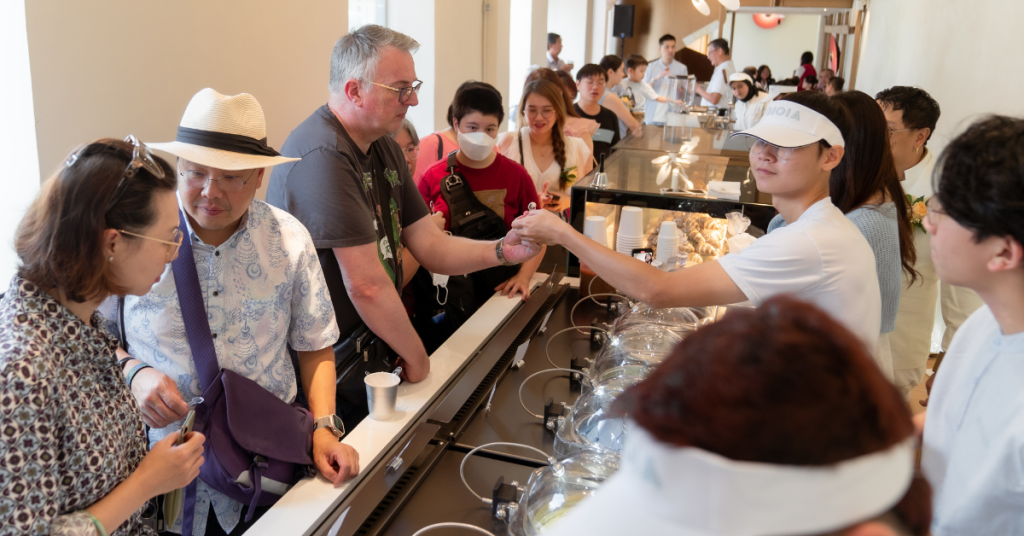
Eric’s expertise plays a significant role here. Having worked with Italian chefs for over two decades, he’s developed recipes that marry local ingredients with Italian craftsmanship.
Still, one of their biggest hurdles was convincing people that their gelato was worth the premium prices, said GIOIA.
“Before coming into GIOIA, people had a big question mark on what’s so premium about it,” the founders admitted. “But the moment they taste it, they know that’s good quality there and we overcome all those challenges.”

Which is why to win over sceptics, GIOIA offers free, unlimited tastings. “We are so confident in our product,” they said. “Once they try it, they understand the quality and the effort that goes into it.”
The art of standing out
Much of GIOIA’s growth can be attributed to its investment in top-notch machinery and thoughtful design, they shared.
“Machinery is where we invest most of our capital,” shared the team, emphasising that it’s a worthwhile expense to ensure their gelato meets the highest standards of quality. Their gelato-making equipment features advanced Italian technology.

These machines have helped them churn out over 80 flavours to date, and GIOIA constantly innovates to surprise and delight customers.
Their flavours range from imported Italian pistachio (Pistacchio) to locally sourced 100% Grade A Musang King durian (II Re Della Frutta Durian).
Seasonal offerings like hibiscus gelato (Ibisco) for Hari Kebangsaan sit alongside Italian classics and local favourites like Tropicale, a tropical blend of fresh banana, mango, and passion fruit.
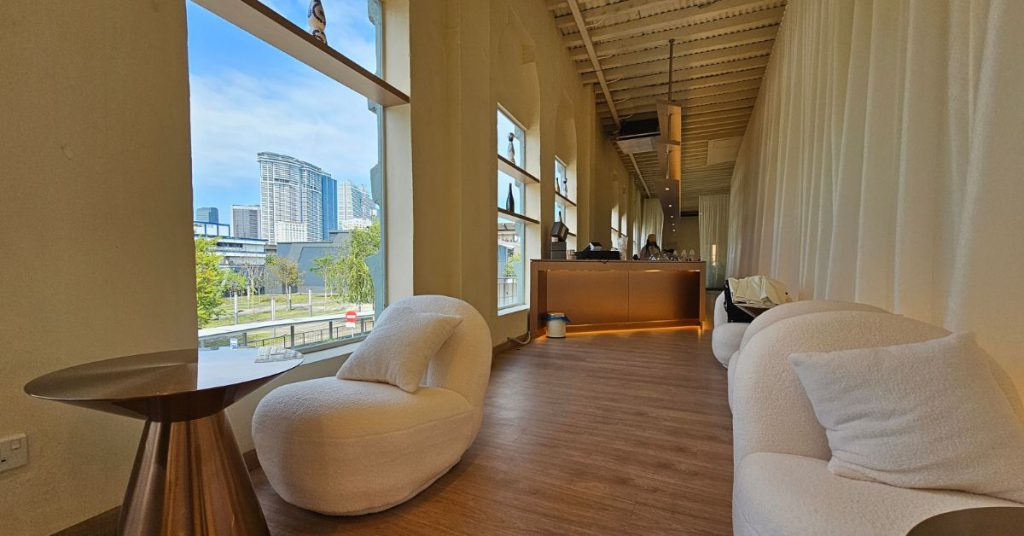
But standing out for GIOIA means more than just offering a quality product. That’s why they also design each of their outlets to offer a distinct experience.
“Every GIOIA outlet is designed with a lot of effort to create the perfect ambience,” they added.
The first outlet in Jade Hills Resort Club, Kajang, overlooks a serene lake, providing a calming environment perfect for enjoying gelato.

Located in the bustling streets of Chinatown, the second outlet offers a cosy, urban chic vibe. The upcoming Bukit Bintang outlet promises yet another different atmosphere.
“Every GIOIA is going to have its own identity,” they explained. “We’re very picky about locations. If we can’t create a story and theme we’re passionate about, we don’t proceed.”
Not just a scoop, but a mission

GIOIA’s short-term goal is to solidify their presence in Malaysia, but they won’t be expanding rapidly through franchising.
Instead, the team is focused on growing the brand organically while staying true to its premium boutique identity by welcoming joint venture partners who share the same passion and enthusiasm for building a solid and fun gelato empire.
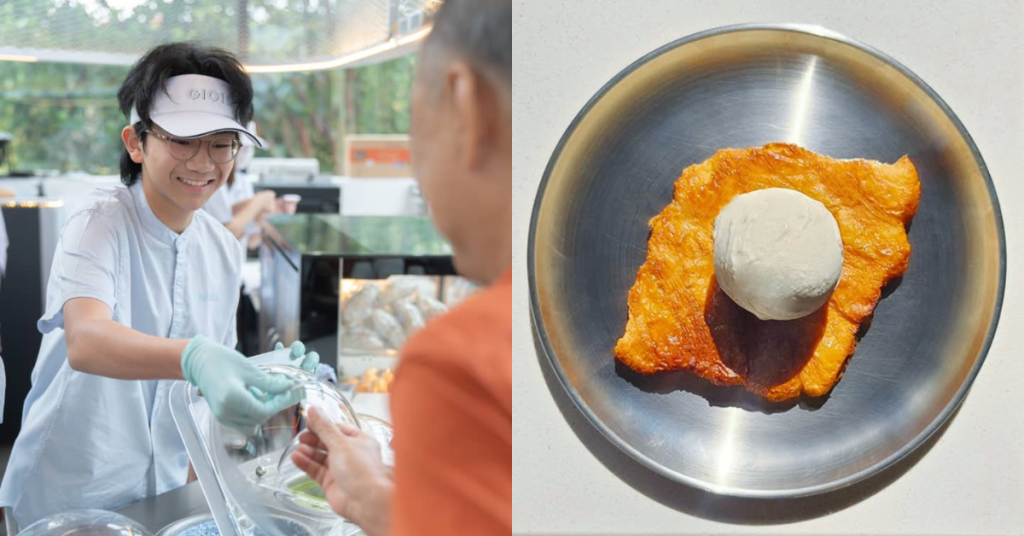
With their eyes set on international expansion as their long-term goal, it seems this journey of joy has only just begun.
But beyond the equipment and aesthetics, it’s the human touch that sets GIOIA apart, the team believes. “A place where people keep coming back because of the food and the service,” they pointed out.
From our experience and looking at the brand’s online reviews, they’ve certainly lived up to expectations.
- You can learn more about GIOIA here.
- Read other articles we’ve written about Malaysian startups here.
Also Read: Critical convos with a focus on impact: How MRANTI is bridging local & global markets
Featured Image Credit: GIOIA
This mum started a cake biz at home to pay the bills, now it’s a full-fledged Shah Alam cafe

Tucked away in the neighbourhood of Shah Alam’s Seksyen 6 lies a cafe known as Manis.
A little under a year ago, however, and you would be hard-pressed to find any trace of this cafe. That is, save for an online business selling baked goods known as WildFlour.
Co-run by Shazana Shukor and her husband, Din, the duo operate hand-in-hand, with Shazana leading the charge in the kitchen and growing the business with her over 14 years of experience in the F&B industry.
Meanwhile, Din heads communications and marketing, engaging with the community being the natural people person that he is whilst still working full time.
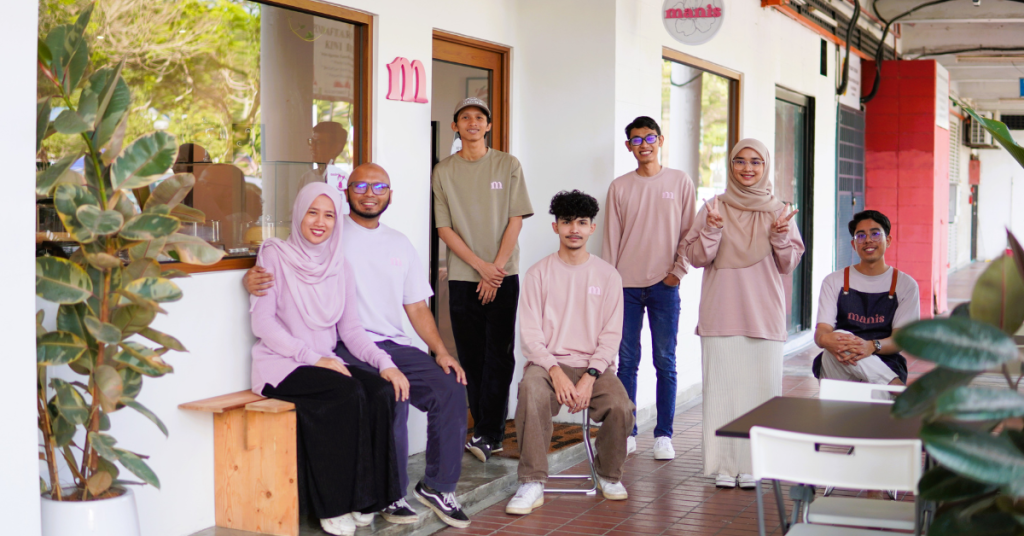
Shazana found her start in the F&B industry graduating with a Bachelor’s Degree in Culinary Arts. From there, she worked her way up to both managerial and trainer roles, eventually providing consultancy and freelance services to new businesses after her daughter was born.
But when COVID reared its head on Malaysian shores, she soon found herself stuck at home with an infant and the need for a way to pay the bills.
That was when the idea for WildFlour Kitchen first came into view.
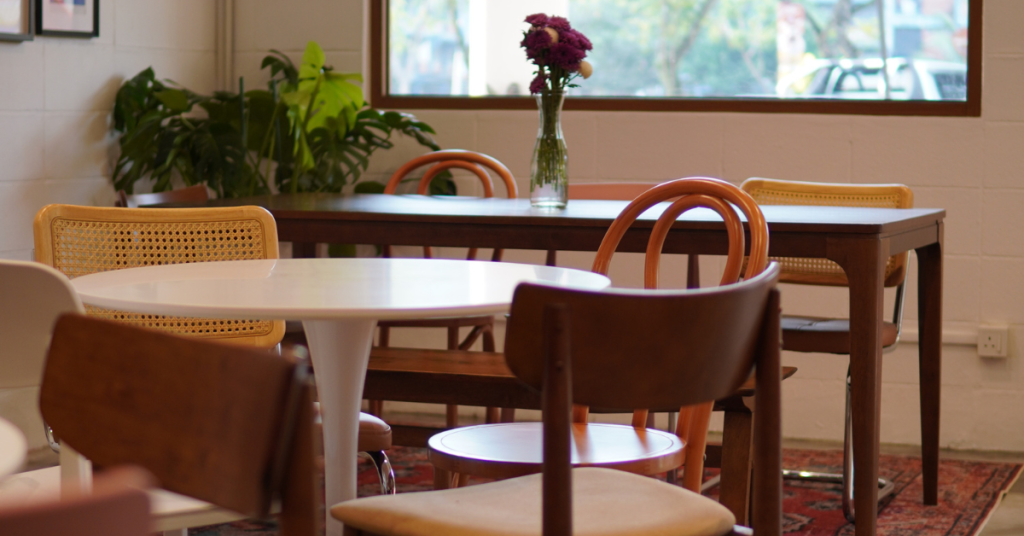
“It started with me baking quiches and sourdough breads to gift to relatives,” she explained.
“I thought, why not ask those following me on my social accounts if they wanted to order, and that’s where it started.”
Making the leap
Beginning with minimal capital, WildFlour’s initial focus was on catering for special orders and events, serving baked goods such as cakes, quiches, and pastries.
But after seeing the positive reception to their baked goods, the two began to envision a space where they could serve their creations in a warm and welcoming atmosphere.
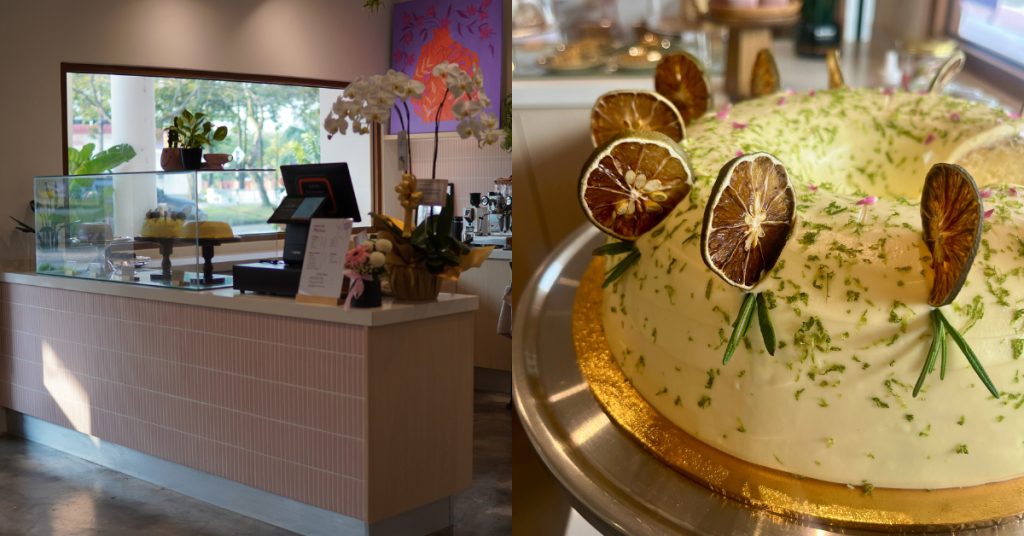
As post-COVID trends eventually saw a shift towards physical dining and online orders slowly began to die down, this dream soon became a necessity and soon enough, Manis was born.
Though the transition would require a significant amount of investment, Shazana knew from past experiences in the F&B industry that she did not want to be tied down by debt or investors. As a result, Manis was funded through a combination of personal savings and reinvested earnings.
“I also did not want to run my business in the red as I’ve seen how a few bad months can kill a small business before it has the chance to survive,” she said.
For their location, Shah Alam was picked due to its low rental costs, the cafe furnished with second-hand and donated equipment. The team and menu was also kept small to ease running costs.
“I was too weary to take a financial risk,” Shazana further elaborated. “Thankfully, with my husband’s encouragement and trust, we decided to take the leap and invested in our ambition to build a community space.”
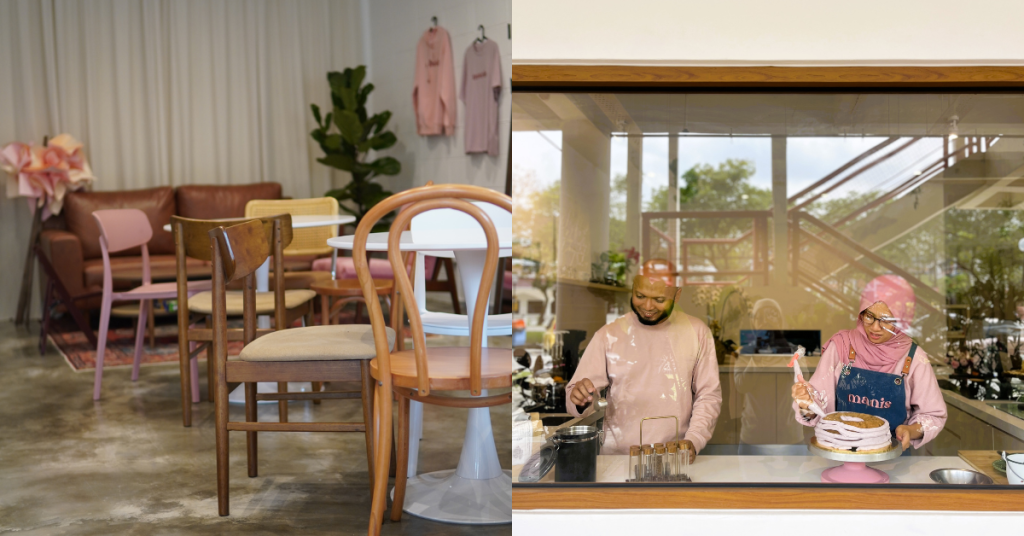
To their surprise, this leap of faith would be met with overwhelming positivity from their local community, exceeding their expectations.
Now, Manis aims to attract visitors from other areas, making full use of their extended menu and atmosphere with the hopes of further expanding their reach locally.
Second wind
Manis offers a combination of comfort foods and drinks, most recipes being developed in-house. Inspiration is sometimes taken from global trends, combining those ideas with local ingredients with the hopes of leaving lasting impressions on their customers.
The exceptions to this creative process are Manis’ three most popular Bundts, cakes with a distinctive ring shape with a hollow centre portion.
A permanent staple of the cafe, the recipes for these were inherited from her mentor, Basira Yeusuff, the head chef of Root Cellar KL.

Having emigrated to Korea to co-found Agak Agak Seoul, Yeusuff’s fans had been missing her Bundts. “She reached out and asked if I would bake and sell her cakes,” Shazana explained.
Other items on the menu include their Tom Yum Quiche, Smashed Sweet Potato with Miso Tahini Butter, torch ginger soda, and their best-seller Mont Blanc, a cold brew served with citrus cold cream.

Slow and steady
Of course, transitioning from a home-based bakery to a cafe comes with its own fair share of struggles.
“Finding and retaining skilled talent is a challenge,” Shazana commented. This, on top of her responsibilities as a mother and trying to meet customer expectations.
“Overcoming these required adaptability, a strong support system, and maintaining our commitment to quality,” she further elaborated.
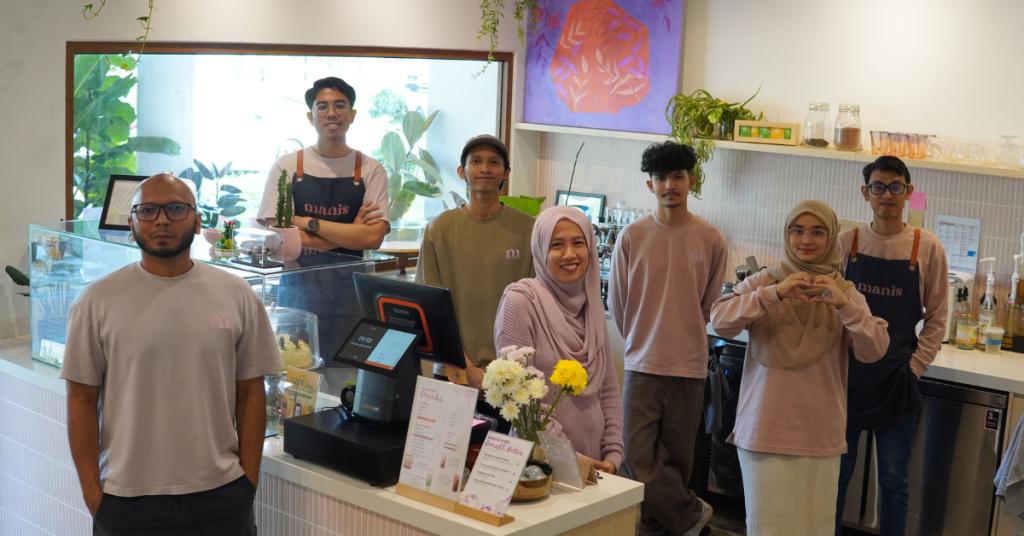
Looking towards the future, Shazana hopes to grow the brand even further, collaborating with other local brands as well as exploring new product lines.
Though this may prove challenging for their small team, she nevertheless believes that staying true to their values will guide them in their endeavours.
“We are in no rush to grow big too fast, we focus on sustainable growth and reinvesting in the business.”
And that’s a perfectly good recipe for success.
- Learn more about Manis by WildFlour here.
- Read other articles we’ve written about F&B businesses here.
Also Read: Critical convos with a focus on impact: How MRANTI is bridging local & global markets
Featured Image Credit: Manis by WildFlour
Meet the M’sian who went viral for making fresh pasta at his roadside stall in Subang Jaya
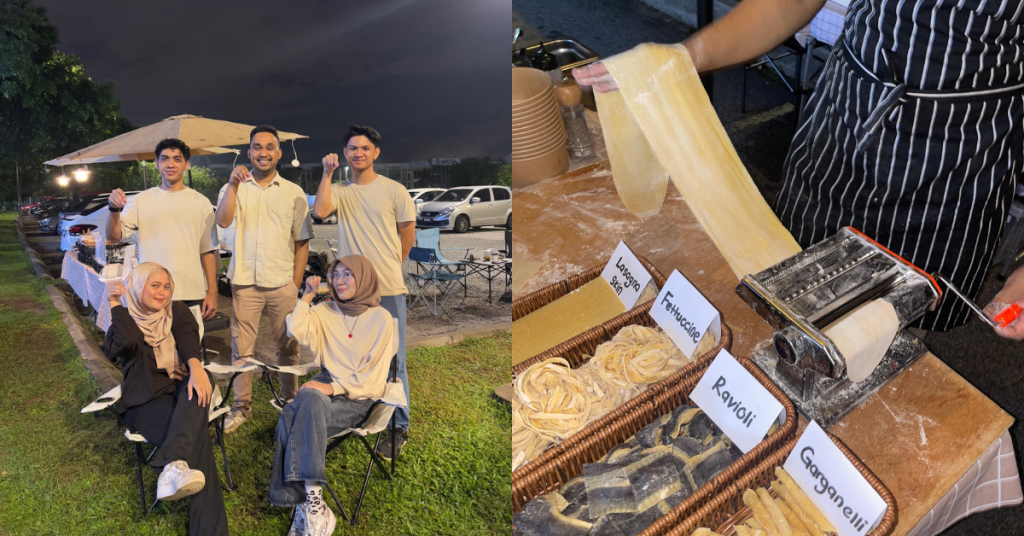
If you’re a foodie who’s always looking for something new to try, you might have come across videos of Pasta Pintal.
Not your usual pasta spot, Pasta Pintal is a roadside stall in Putra Heights, Subang Jaya that serves fresh pasta.
The chef behind this venture is Mohamad Faeizuddin bin Hussein, who goes by Faeiz. Hailing from Wakaf Bharu, Kelantan, he graduated with a Bachelor of Science in Culinary Arts Management (Honours) from UiTM Puncak Alam.
The 31-year-old boasts over 10 years of experience in the culinary field, and has experience working at five-star hotels and semi-fine dining restaurants.
Last year, he decided to bring his culinary chops to a less typical environment—a streetside stall.
Making fresh pasta accessible
Established in October 2024, Pasta Pintal was born out of Faeiz’s fascination with the process of making fresh pasta from scratch.
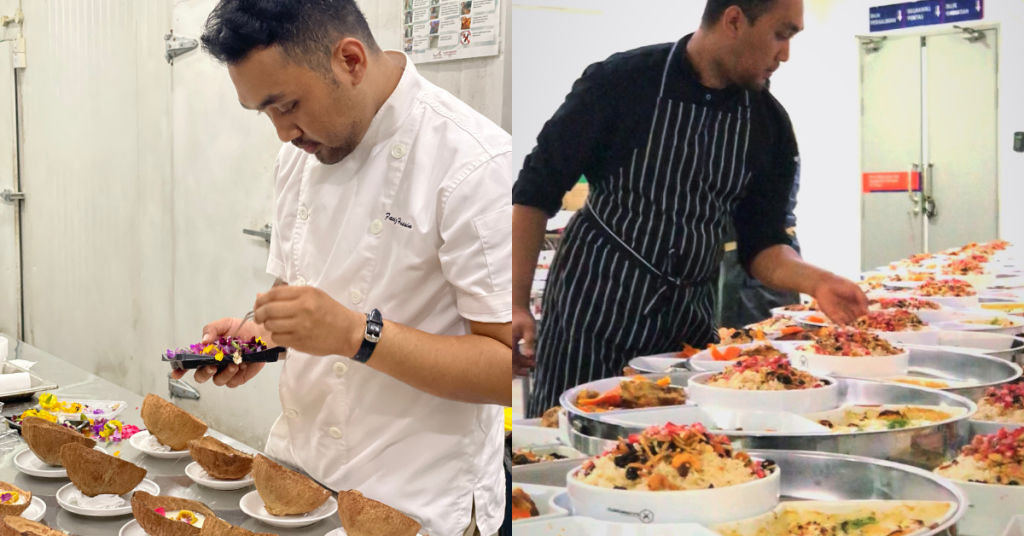
His partner also had the opportunity to try fresh pasta in Italy, which led to them both falling in love with the dish’s unique texture and flavour.
“As someone who grew up in a small rural area, starting a business like this was a way to change my life and share something extraordinary with others,” Faeiz shared with Vulcan Post.
He continued to express, “Fresh pasta is unique, requiring skill and care in its preparation, and it has become my passion. I firmly believe in the mantra ‘hard work never betrays’ and started this venture with confidence in my skills and knowledge.”
The idea to launch Pasta Pintal as a roadside store was pretty simple—less than creating a gimmick, it was more about practicality.
It offered them a way to grow organically while managing costs. Plus, it’s a way to build relationships with customers in a casual, personal setting.
He explained, “I enjoy the charm of interacting with people from all walks of life, learning from them, and creating a sense of community.”
Offering fresh flavours
Pasta Pintal offers quite a range of different pastas, from lasagna to fettucini to raviolis.
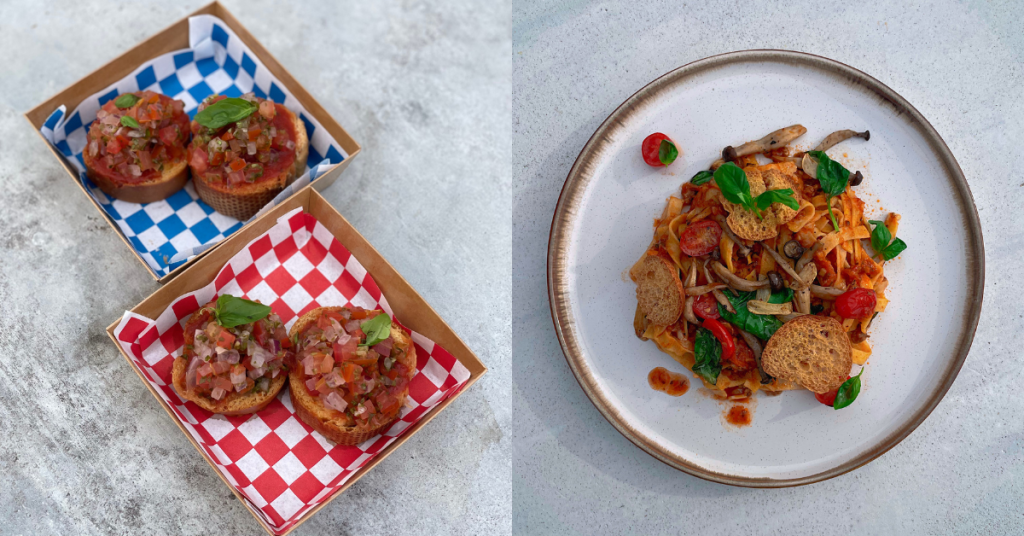
Their menu includes crowd-pleasing flavours such as creamy smoked duck, bolognese beef, and salted egg crispy chicken.
“Our menu reflects years of experience and creativity in the culinary field,” Faeiz said. “While we offer a core selection of signature dishes, we also introduce seasonal or special occasion menus for celebrations like Chinese New Year and Deepavali.”
Last year, they launched an Indian Butter Chicken dish. Pasta aside, they also offer bruschetta.
Prices for the pasta range from RM19 to RM24, which is relatively affordable when it comes to freshly made pasta.
Looking “pasta” criticisms
While there has been some positive buzz surrounding the business, there have also been some criticisms online—and some got pretty viral. A video by popular local food reviewer, Jason Chen, garnered over a million views on TikTok. Unfortunately, he didn’t have the best comments to give.
When asked about that, Faeiz responded, “Taste is subjective, and we respect everyone’s opinions. We welcome feedback as an opportunity to improve while remaining confident in the quality of our food, which is crafted with fresh, high-quality ingredients with care and attention to detail.”
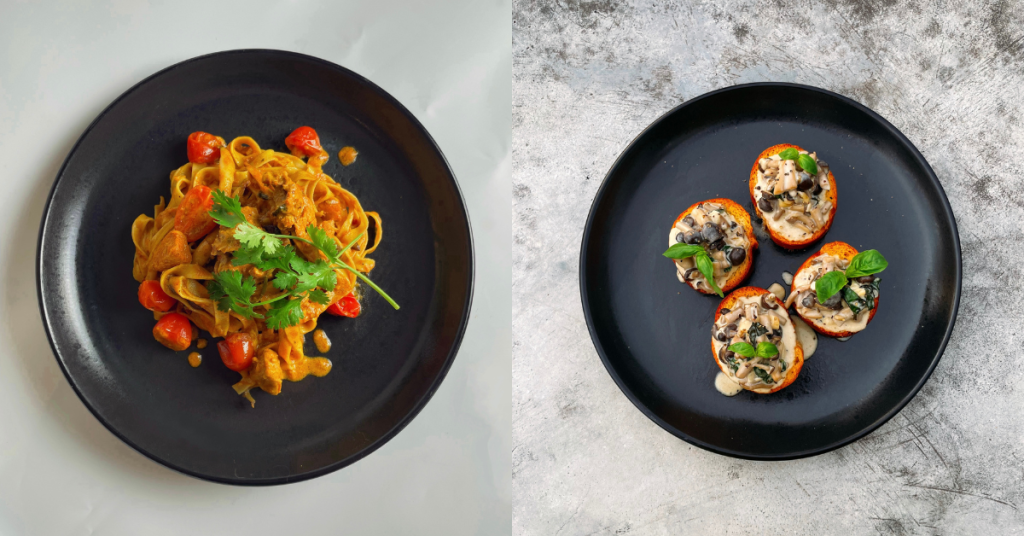
For those who might be concerned about the legitimacy of his roadside stall, Faeiz assured that Pasta Pintal operates with an SSM certificate and a registered business bank account.
“While we’re still in the process of fully complying with local regulations, these steps are part of our ongoing commitment to improving and formalising our business operations,” he clarified.
Criticisms aside, what has been truly challenging is Mother Nature and her whims.
“Weather inconsistency has been one of our biggest challenges, particularly when making fresh pasta outdoors during heavy rain,” he mused. “Limited space and logistics have also been hurdles, often requiring multiple trips for equipment.”
But you live and you learn. Over time, the team has adapted their processes, improving them by investing in practical solutions.
Fresh future ahead
Three months into the business, Faeiz runs Pasta Pintal with his partner as well as a team of part-timers who help ensure smooth operations.
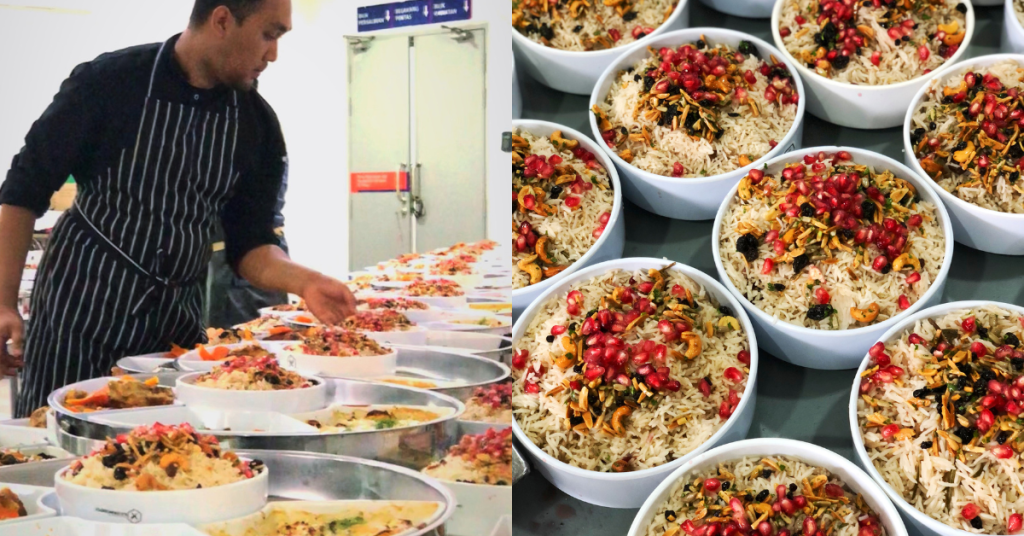
“This venture was entirely self-funded through personal savings, which gave us full control over how we structured and developed the business,” he added.
Although they didn’t share any financial figures with Vulcan Post, Faeiz shared that they’ve been growing sustainably and reinvesting in the business.
The team aims to participate in more events to grow Pasta Pintal’s brand visibility. With that, they envision opening a dedicated brick-and-mortar restaurant that specialises in fresh pasta, complemented by an expanded menu to reach a broader audience.
- Learn more about Pasta Pintal here.
- Read other articles we’ve written about Malaysian startups here.
Also Read: Inside the exclusive programme for startups by Grab Malaysia, GXBank leaders & Endeavor Malaysia
Featured Image Credit: Pasta Pintal

